Lutheran AMBASSADOR



“What does a man gain by all the toil at which he toils under the sun?” (Ecclesiastes 1:3).
“All things are full of weariness; a man cannot utter it” (Ecclesiastes 1:8a).
“And I applied my heart to seek and to search out by wisdom all that is done under heaven … I perceived that this also is but a striving after wind” (Ecclesiastes 1:13a,17b).
In the year that I’ve worked at a Christian university, I’ve encountered many students who feel overwhelmed by the weariness of trying to understand the world, the Church, and their faith. They start to secondguess whether the work that they were raised to value is, in fact, valuable. They start to fear that searching out God’s wisdom is fruitless because it is disconnected from their lives. They come to the end of their mental capacity of trying to make sense of evil, suffering, justice, and inexplicable mystery. “All things are full of weariness.”
It is tempting in moments when we are confident in faith to see people like these as being blind to reality. But I think that often what they are identifying is precisely what the Preacher of Ecclesiastes calls “a striving after the wind.”

Ecclesiastes doesn’t seem to be saying, “I thought everything was meaningless but then I found God.” Instead, the author suggests that everything is actually meaningless apart from God.
Recently, I found myself distrusting my own reason and emotions to the point that I started
to doubt whether I could discern anything true about Scripture at all. If my heart is corrupted (Jeremiah 17:9), how can I possibly interact with Scripture in the right way? How can I trust any of my interpretations of it? “I perceived that this also is but a striving after wind.”
I don’t think my fear was unfounded. My heart is desperately wicked. But during a phone call with my parents, my mom reminded me that while I interact imperfectly with Scripture, the Word, Christ Himself, also interacts with me. Jesus is able to bypass the misguided reason, confusion, and toil that we bring to our faith and cut into our innermost being with the sword of His tongue (Revelation 1:16). “Search me, O God,” the Psalmist writes, “and know my heart!” (Psalm 139:23). We pray this because we cannot know our hearts well ourselves.
If something—or everything—feels meaningless, our comfort is that, unlike us, Jesus Christ does understand our hearts and lives. He toils to know and heal us, but His work is not a striving after wind. God’s Word will not return to Him empty (Isaiah 55:11). Held together by this promise, we can pray without fear or weariness the same words Jeremiah spoke after his confession of sin: “Heal me, O LORD, and I shall be healed; save me and I shall be saved” (17:14).
Pastor Andrew Kneeland laeditor@aflc.org
Ruth Gunderson ruthg@aflc.org
Liz McCarlson lasubscriptions@aflc.org
Pastor Jerry Moan Pastor J. Christian Andrews
The Lutheran Ambassador (ISSN 0746-3413) (USPS 588-620) is published monthly by the Association of Free Lutheran Congregations, 3110 E. Medicine Lake Blvd., Plymouth, MN 55441 Phone (763) 545-5631
Periodicals postage paid at St. Paul, MN and additional mailing offices.
Send address changes to The Lutheran Ambassador, 3110 E. Medicine Lake Blvd., Plymouth, MN 55441.
Skogerboe, a 2018 graduate of the Free Lutheran Bible College, Plymouth, Minn., lives in Orange, Calif.
subscription changes and information 3110 E. Medicine Lake Blvd., Plymouth, MN 55441 763-545-5631
lasubscriptions@aflc.org
To God the creator triumphantly raise, Who fashioned and made us, Protected and stayed us, Who still guides us on to the end of our days.
—Ambassador Hymnal #150 (Katherine K. Davis)
If I have nothing else to rejoice in, I will bless Him that ever these words were possible: “Jesus Christ came into the world to save sinners.”
—Charles SpurgeonGratitude is the echo of grace as it reverberates through the hollows of the human heart.
Although he gives and provides these blessings bountifully, even to the godless and rogues, yet he wishes us to ask for them so that we may realize that we have received them from his hand and may recognize in them his fatherly goodness toward us.
—Martin LutherLuther was the man who, guided by experience in the life of his own soul, again made people understand the original and true meaning of the gospel of Christ.
—Herman Bavinck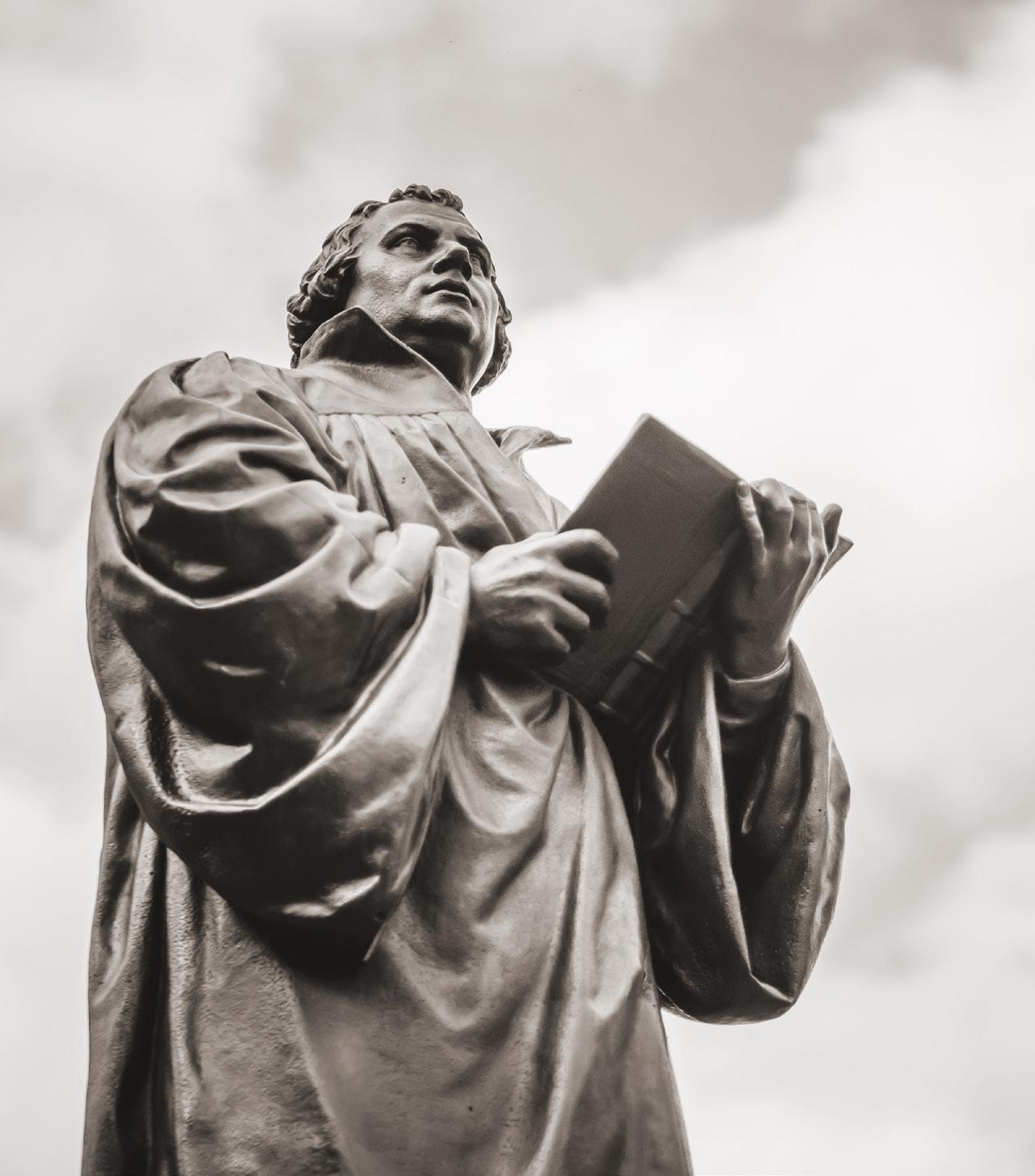
At the AFLC Annual Conference in June, we picked up a CD of the 2017 Reformation Festival Service held at the Free Lutheran Seminary chapel in Plymouth, Minn. I listened to it with pleasure, hearing not only wonderful hymnody but also Pastor Bob Lee’s always winsome and informative commentary. It so happened that I was, at that time, re-reading part of Charles Porterfield Krauth’s The Conservative Reformation and It’s Theology (1871). For those unfamiliar, Krauth was a nineteenth-century American Lutheran theologian and churchman whose career centered around defending and promoting confessional Lutheranism against many who sought to disown much of our theological heritage and make it more “American.” It is safe to say that Krauth’s work kept many Lutherans Lutheran for many years.
As it was 150 years ago, so today we must confront the question, “Why should we remain Lutherans?” Why shouldn’t we simply become generic Protestants like so many seem to be doing now? Why cling to a 500-year-old theology along with the trappings of much of Lutheranism that seem to some to be too like Roman Catholic practices? Why not just follow the lead of so many large churches which have given themselves names that describe nothing about what is taught therein and use theatrics instead of traditional worship? Many of these churches have abandoned the ancient creeds of the Christian Church and treat doctrine as if it is a case of smallpox.
Let’s first think about the principal problem with modern generic Christianity and then address how our Lutheran heritage is more in tune with the faith handed down once for all. I’ll use Krauth for guidance here. First, Krauth writes, “Error loves ambiguity.” In other words, where the search for truth is reduced to the first Church creed, “Jesus is Lord,” all sorts of errors can quickly arise, just as they did in the ancient
Church. The Church struggled for centuries with the definitions of orthodoxy. That’s why we came to have creeds in the first place—to keep us centered in that which the Holy Spirit has revealed to us in the Scriptures.
We should not doubt that error is relentless. Krauth also taught about the infiltration of error into orthodox churches, which we have seen all too clearly in recent years. First, error asks to be allowed—saying it won’t seek to change the views of others, only asking to have its own allowed. Then error demands to be accepted as one other “correct” option; claiming it has been allowed confirms it is viewed as acceptable. Finally, error requires supremacy for itself. What began as vague accommodation then becomes an attack on truth itself.
If we seek to be a biblical and confessional church, error must not be allowed to get even a foothold. This is especially true in a congregational polity like ours in the AFLC where these battles will be fought, not in synods or districts, but in local congregations. That means that pastors and other church leaders must have a firm grounding in Scripture and in why the Lutheran church has the purest expression of the gospel as found especially in the Augsburg Confession and the Large and Small Catechisms.

Krauth fought vigorously against the concerted attempts to water down Lutheranism in America by focusing attention on catechesis in the church. In other words, teaching what Luther and the generations following have always taught about such things as baptism, the Lord’s Supper, and salvation. We should vigorously teach correct doctrine, not just because it is Lutheran, but because Lutheran doctrine is biblical doctrine.
I’ll close with another Krauth quotation, one which sums this up better than I can: “No particular church has, on its own showing, a right to existence, except as it believes itself to be the most perfect form of Christianity, the form, which of right should and will be universal. No church has a right to a part, which does not claim that it should belong to the whole.”
Culler is a member of St. Paul’s Evangelical Free Lutheran, Hagerstown, Md.
This time of year reminds us how God has blessed the Church through the work of Dr. Martin Luther, the reformer. Under the grace of God, Luther restored the chief teachings of the New Testament—the true gospel that we are saved by faith alone (Romans 3:28). The emphasis here is “by faith alone.” Practically all Christian denominations teach justification by faith. However, by way of contrast, very few teach justification by faith alone. Many teach that you are saved partly by faith in Jesus and partly by your own good works.
It is difficult to talk only about Luther and his hymns—Luther was a many-talented and gifted person. Just to mention a few of his God-given abilities: Luther was a theologian, a translator of the entire Bible, and a musician, being an accomplished lute player and a tenor singer. In many instances, while writing his 37 hymns, Luther wrote both the words and the music to the hymns. In doing so, Luther also showed his poetical skills. By writing hymns, Luther restored and fostered congregational singing in Christian churches throughout the world.
Along with his associates, Luther became the father of the hymnbook. As the years rolled by, he inspired clergy, composers, and organists to bring church music to new heights. Today more organs— both pipe and computer organs—are being made than at no other time in history. Even in the country of Israel alone, there are 40 pipe organs, not counting computer and digital organs.
What inspired Luther to write hymns and encourage congregational singing? One event was the burning at the stake of two fellow Augustinian monks by the names of Heinrich Voes and Johann Esch on July 1, 1523, in Brussels. With Luther they had discovered and embraced the newly found gospel that a man is saved by faith alone without good works. For this precious gospel, these men were willing to be burned at the stake, and thus, they became the first Lutheran martyrs.
By Pastor Gordon WatermanThe Roman Catholic Church, as damage control, spread the lie that these two monks had recanted and made peace with the Church before they were put to death. Luther was not happy with this spin, and so to set the record straight, he decided to put the matter into verse.
Luther’s first attempt at poetry was the folk balled called “A New Song Here We Shall Begin.” In 12 verses Luther sets the record straight about the two Lutheran martyrs. You can read his 12 verses in Luther’s Works, Vol. 53 (pages 214–216). We remember that in Luther’s day there were no newspapers or radio broadcasts. A large number of the people could not read or write. To get the truth out to a large number of people, Luther used singing minstrels to spread his verses all over Germany and beyond. Thanks to the improved Gutenberg press, multiple copies could be made of his verses.
With the success of this ballad, Luther turned to writing and composing hymns for the church service. Later in 1523, Luther wrote seven hymns. In 1524, he wrote 13 hymns. That means that in a year-anda-half, Luther wrote more than half of the 37 hymns he composed. (How many of Luther’s hymns in our AFLC’s Ambassador Hymnal can you name?)
Luther’s central hymn is “A Mighty Fortress is our God.” Based on Psalm 46, this hymn’s central focus on God’s grace has given strength and comfort to Christians throughout the ages. It has been translated into hundreds of languages and hundreds of composers of organ music have set its melody into chorale preludes. Johann Sebastian Bach’s prelude for the organ is likely the most famous, as well as his Cantata No. 80. Who can forget to mention Felix Mendelssohn’s Reformation Symphony?
Waterman serves Crown of Life Lutheran, Tomball, Texas. “Lyrics Seller,” by Jan Gillisz. van Vliet (1632–1634).
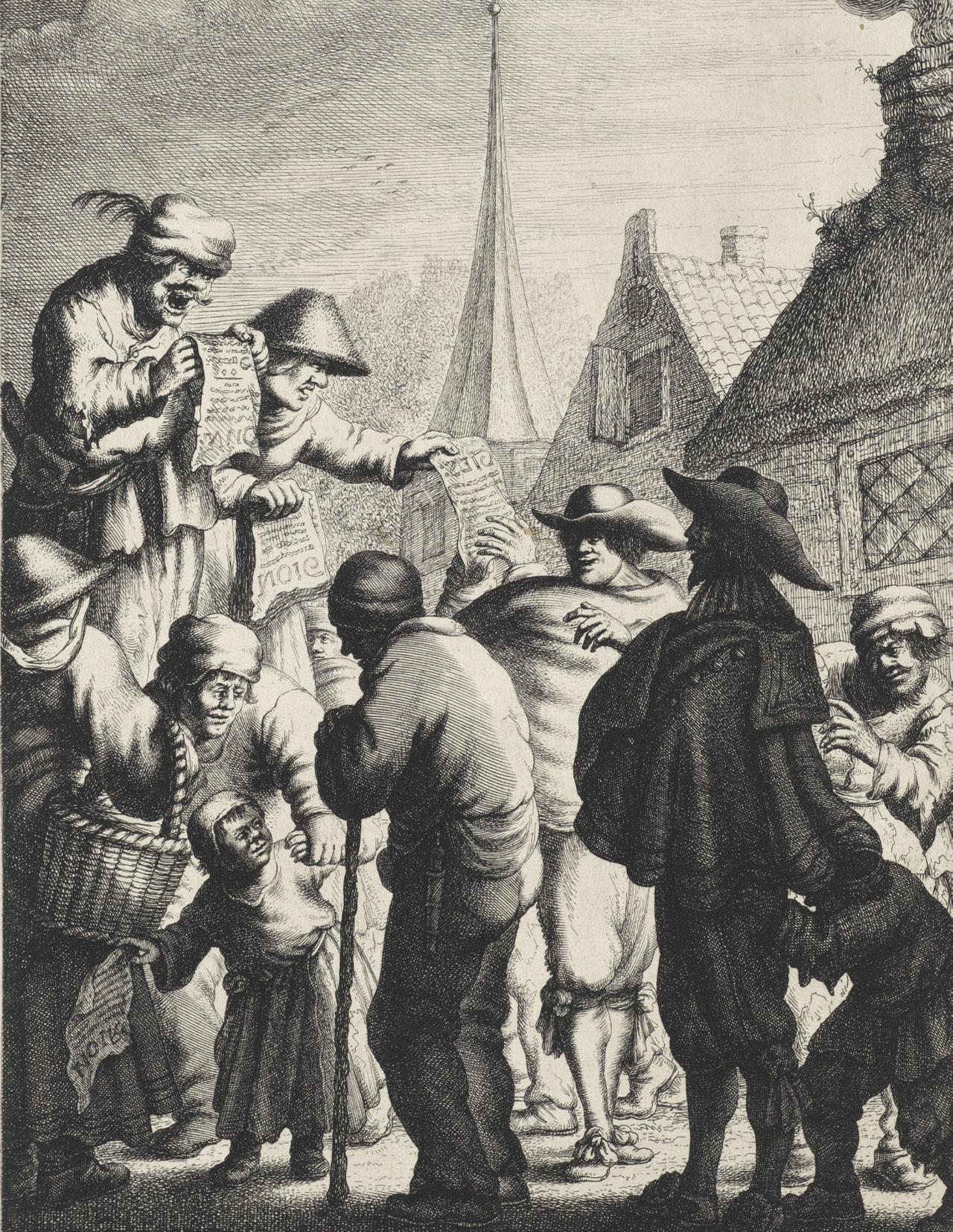
There is in all people a tendency to live off of the greatness of past memories. There are still Christians who believe that all is well, because they have some old memories and Christian experiences that they can bring forth now and then. They look at them and show them to others as evidence of their Christianity and the state of grace that they live in. ...
In the same way, many Lutherans try to live off of Luther’s greatness and the Reformation’s mighty struggle. They try to live without having any personal experience of the Reformation and without drawing the conclusion that if the Reformation is a work of God’s Spirit for the resuscitation of God’s church and congregations, reformation is necessary for every time and every person. That Luther at one time lived and fought and conquered does not make us Lutherans unless we have the same spirit, the same fight, and the same victory. ...
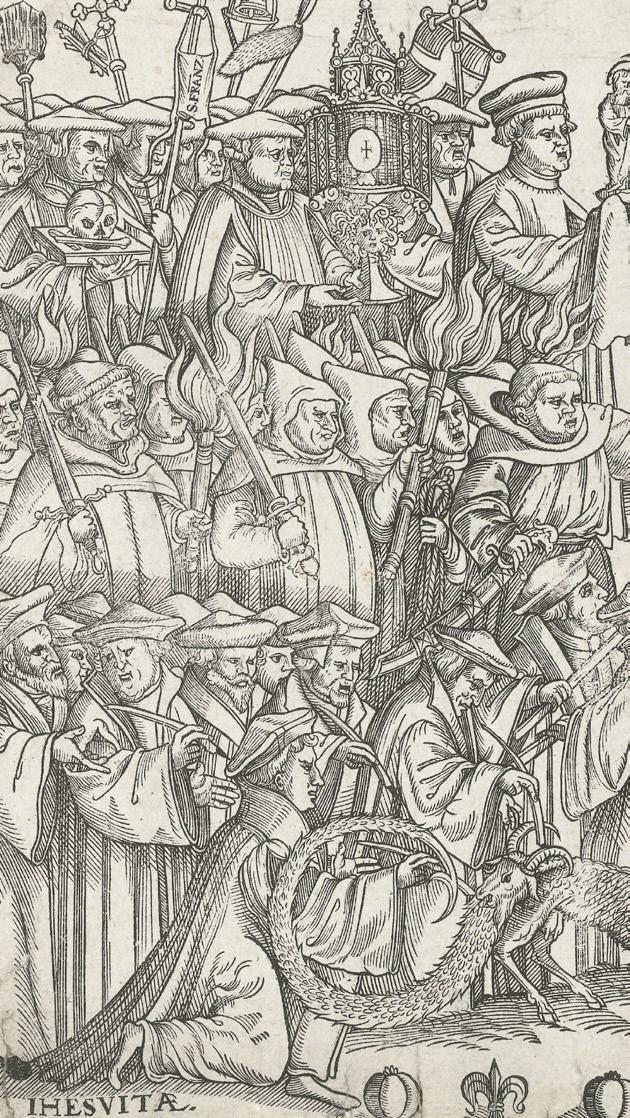
Brothers, there was Spirit in Luther! And it was not with the arrogance of pure teaching that he strove against the mighty Roman colossus. It was in the name of the Lord of Hosts and with little David’s childlike faith that he went out to meet the great Goliath. In the struggle for the liberation of the soul from the church’s bitter, works-righteous yoke, he fought with the only weapon that could help him in such a fight: God’s living Gospel.
And he did not take up the fight; he went against his will and inclination; he did not crusade
in the hope of a great victory. No, he was dragged into the fight, because he himself had been freed by God’s Spirit through the simplicity of the Gospel. And the great, mighty Roman Church could not stand this one free soul. ...
Just as at the dawn of Christianity the Roman emperor could not tolerate the men who answered, “We must obey God more than men,” so the Roman pope could not tolerate the man who said: “We are made righteous, with no merit of our own, by faith alone without good works’ service and without the church’s intercession.”
Will this freedom fight continue? Do souls need to be freed in our time, just as Christ’s Gospel freed Luther’s soul?
Or has freedom become superfluous or even harmful? Has Christianity taken on a new form, so that souls are no longer freed in the same way? Has God’s congregation become something other than it was, so that it no longer is built by the same Mediator? ...
But if some of us are to be equipped to practice Lutheran preaching in the congregations, there is one thing necessary. Without this one necessary thing, it is useless for us to even try: we must walk the same path that Luther walked.
I do not mean that we must go into a cloister and become a priest and receive a doctorate of theology. I mean that it is absolutely necessary to walk upon the same inner path so that we know sin and grace within the context of the sorrow and gladness of our whole hearts.
We will not be separated from sin’s burden
without knowing where it presses us down, nor can we be freed from sin without faith in the Lamb of God. And if we don’t know freedom ourselves, what heart do we actually have for others’ need? What remedy can we bring, when we ourselves have not experienced the Gospel’s freeing power? There is no chain that binds souls in sin and sin’s accompanying fear that is not broken in Jesus’ blood.
All spiritual slavery comes from this one source. If the yoke of sin and fear is broken and the soul reconciled with God, then it is vain to lay human laws and burdens on consciences.
If you will be free, then walk this path. If you wish to receive a rock to stand on and firm ground to build on, then do not fear the path that Luther walked.
That which we must learn before anything else is learned, is our absolute incompetence. We cannot help ourselves to righteousness before God, and we cannot bring ourselves to peace with Him. So long as we strive at the Sisyphean task of self-help and self-righteousness, we are slaves, bound under slavery to sin, slavery to the law, slavery to God’s wrath, and slavery to the church. But when in full surrender of everything we cast ourselves into the arms of Jesus Christ our Savior, we are free—free in the salvation of God’s grace.
... The epitome of the preaching of the Gospel is the preaching of Sin and Grace. It will say: The first thing that will help the soul to receive that steadfast confidence, which neither life nor death can take from it, is a thoroughgoing declaration
of bankruptcy that never comes about without “the sinful miserable feeling” of the knowledge of complete sinfulness.
Because as long as we believe that we are still useful for something, we go around moaning and gasping, tottering and raving under the yoke. Sometimes we think the yoke is gone. Afterwards we feel that it slips back on, and in this manner we go on from day to day, from year to year, and never actually leave behind the exhausting slavery.
... But we have received grace in order to say: Drop everything! And even more so we must add: Hold on to Christ!
That is faith. And He is the Savior. For that soul who, quite helpless and completely empty, takes refuge in Him shall truly be helped. ...
That was Luther’s life work, to fight to free the soul from sin and the pangs of conscience, to free it from slavery to the law and the heavy service of self-righteousness, to free it from the suffering of a conscience without peace and to free it from the hard yoke of the church that lays on frightened hearts.
Will it be also our life’s work, brothers?
“The Meaning of the Lutheran Reformation in Our Time,” reprinted and excerpted with permission from the Sverdrup Journal, vol.13, 2016. Translated by Kristopher Coffman. This speech was given at the Reformation Fest, Oct. 31, 1897.
Artwork: Luther’s Triumph, anonymous (15661568), from Rijksmuseum.
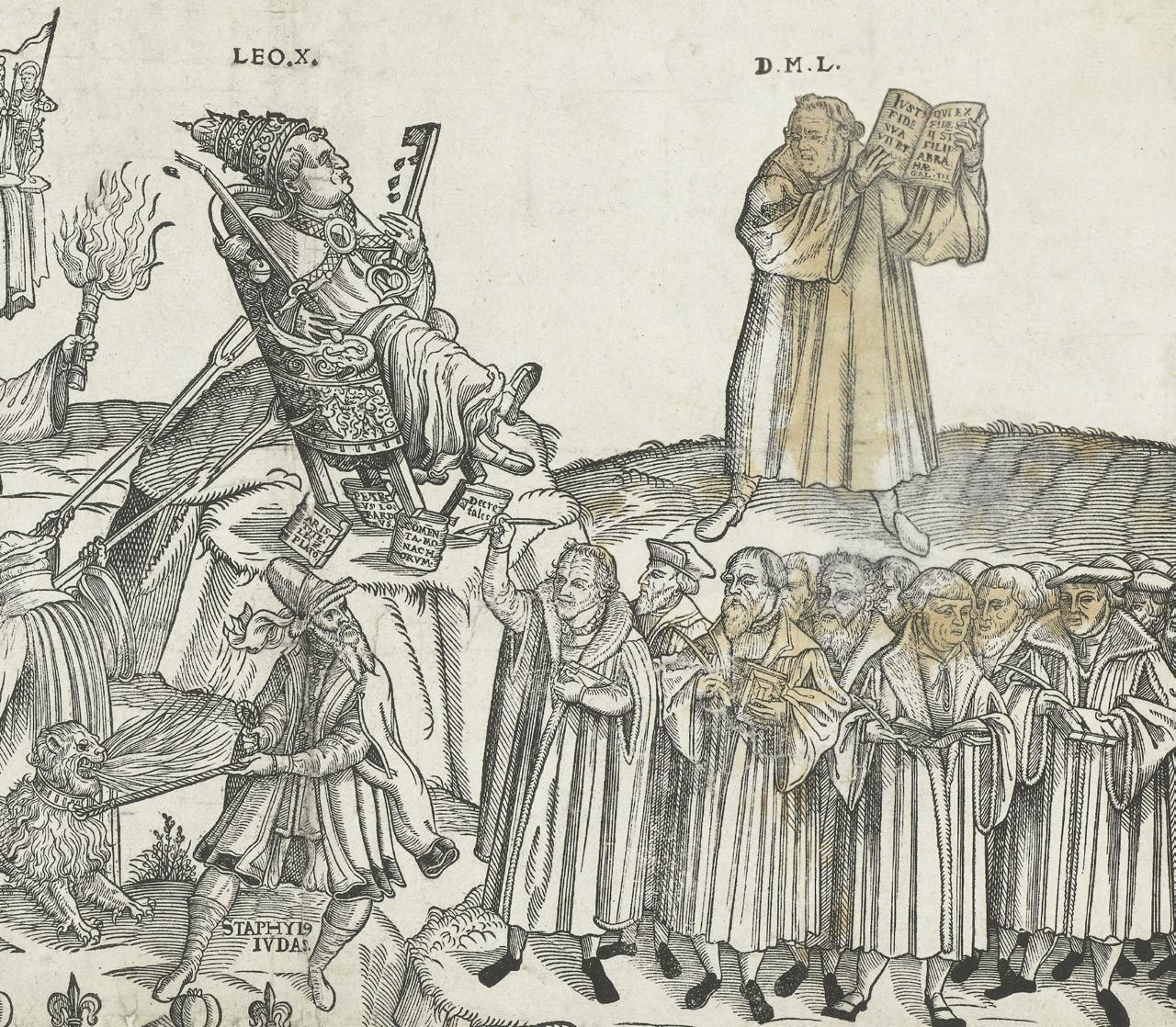
More than 500 years ago Martin Luther made an amazing discovery that changed the course of history. The church was in deep darkness, but the light of the gospel was about to break through. Of course, I’m talking about the Reformation.
Some equate the Reformation with dusty, old tomes and boring history. Nothing could be further from the truth. Here are two truths that have captured me.

In the gospel of grace, there is freedom.
“Although [Luther] diligently confessed his sins, he could find no assurance that God was forgiving them,” writes Scott H. Hendrix in Martin Luther: Visionary Reformer. Luther found that the righteousness of God is a gift, received by faith alone in Jesus Christ. The freedom found in Christ changes everything. Like Luther, I have been set free from the chains of sin that once weighed me down.
In the gospel of grace, Jesus Christ is preached.
The Reformation floods my soul with Jesus. In Luther’s sermons he tenaciously preached Christ. I need to hear the Word alone, Christ alone, grace alone. I need that kind of preaching. Every Sunday.
I wasn’t there but it seems … I was!
Lombardo is a member of Helmar Lutheran, Newark, Ill.
When asked to write about baptism I hesitated to say yes, explaining to Ruth Gunderson that I was not baptized as an infant. I was a teenage believer when I was baptized. She said that Pastor Robert Lee had explained that to her but had also expressed the opinion that I could give a rather unique view on the subject. Upon further reflection, I said yes. After all, I am thankful for my baptism.
I was converted at the AFLC Family Bible Camp that was held at Lake Geneva near Alexandria, Minn., in the early years of the AFLC. I was 13. I already had one year of confirmation under my belt and would enter my second year in about a month. Yet I was not the same person, spiritually. Now, as a new believer, I had a genuine interest in my confirmation studies and approached them with a zeal to really learn the material and apply it to my life.
Several months before our confirmation date, Pastor Lee approached me to let me know that I needed to be baptized before I could be confirmed. I don’t really remember many of the particulars about preparing to be baptized, but I was excited about getting baptized, not because I believed that I was going to “get saved,”—I already was—but because it afforded me the opportunity to express my faith publicly to my family and my church. For that I was truly thankful.
As a young Christian, I struggled to accept the Lutheran teaching about baptism. I was quite content to accept baptism merely as a means of outwardly professing faith already existing in my heart. I really didn’t focus on anything God might do in the waters of baptism.
I entered seminary, years later, still confused about the biblical teaching of baptism. It wasn’t until well into my first year of seminary that my heart and thinking were changed. First, I realized that faith is a gift given to us by God. I could no more believe in Christ as my Savior than could a little child. Martin Luther’s biblical teaching rang true to me: “I believe that I cannot, by my own reason or strength, believe in Jesus Christ my Lord, or come to Him, but the Holy Spirit has called me through the Gospel ...” (my emphasis).
I began to look at my conversion differently, which led to a review of baptism in general, and my baptism in particular. Faith is a gracious gift of God. I didn’t

produce it, God did. He worked it in my heart through the preaching and teaching of the gospel, the good news of Jesus’ saving work on my behalf. Jesus was my Savior and God had worked faith in my heart to accept that truth. Faith wasn’t my work but my gift from God! It wasn’t primarily intellectual assent on my part but the experience of a childlike trust in Jesus Christ as my Savior. It was not my doing, but a gift from a God whose gifts are always good and perfect (James 1:17).
Since faith is a gift from God to man, I began to realize that even infants could be recipients of that gift. Even infants could be saved. How many of the million or so Israelites who passed through the parted waters of the Red Sea on dry ground carried helpless infants in their arms? Even though they didn’t understand the experience intellectually, they experienced the same salvation which God alone graciously provided. It is not water alone which saves in baptism, it is water applied in connection with the Word and promise of God. Baptism isn’t something we do for God, but what He does for and gives to us.
So, what about my baptism? Had I missed something important about it? Only what God did in and through it. True, I already had faith in Jesus as my Savior. Further, it was true, I had a wonderful opportunity in my baptism to confess my faith in Christ to all who witnessed it. But doesn’t God have a noteworthy part? Yes. In baptism God publicly confirms His acceptance of the one baptized as His believing child. As Henry Eyster Jacobs puts it in A Summary of the Christian Faith, “In adults, [baptism] is a means of confirming and strengthening faith which has been received previously through the hearing of the Gospel.” I confessed my faith publicly. God, in my baptism, publicly confirmed His acceptance of me as His dear child. And in my baptism God strengthened my faith to more confidently believe that God, who makes no mistakes, remains committed to me in this most personal relationship and will continue to do so until He brings me unto Himself in eternity.
I am so thankful for my baptism.
Jorgenson is the vice president of the AFLC and the assistant to the president of the AFLC.
ne morning this past September I was listening online to a family sharing hymns and worship songs. God began to grip my heart when I heard the hymn “Ten Thousand Angels.” The chorus reads,
He could have called ten thousand angels
To destroy the world and set him free
He could have called ten thousand angels
But he died alone for you and me.
Tears gathered in my eyes as one of the family members began to play “Amazing Grace” on the piano. This was later followed by a reading of Hebrews 4:16, “Let us then with confidence draw near to the throne of grace, that we may receive mercy and find grace to help in time of need.” I was in awe as I thought about this throne—not a throne of judgment, but a throne of grace and mercy to which I can come boldly.
For many years I have struggled to rest in the truth that all my sins have been paid for—my past, present, and future sins. That day in September, as the words in these songs and Scripture washed over me, I sensed Jesus doing a deep work of solidifying this truth in my heart. In response, I wrote in my journal, “Jesus wants me to live every moment with the reality of what He has done on the cross. There is nothing more I need; my sins have been paid in full and I will spend eternity with Him. Every day is an opportunity to express gratitude for what He has done for me and to give my life back to Him.”
This is where real gratitude begins, at the cross. Living in continual thankfulness to Jesus for what He has done on our behalf lays the foundation for a life of gratitude.
Nancy DeMoss Wolgemuth shares similarly in her book, Choosing Gratitude. She writes, “Being humbly thankful to God for our salvation—the most undeserved transaction in our personal history—is the starting point for the purest form of gratitude: God-ward, Christ-centered gratitude.”
I can remember back when I was growing up how my parents modeled daily gratitude. By God’s grace they lived out this verse, “Give thanks in all circumstances; for this
By Elizabeth Joreis the will of God in Christ Jesus for you” (I Thessalonians 5:18). My mom reminded me that everything in life is a gift and not a right, and my dad often encouraged me with his words of thankfulness.
One of my favorite ways to practice gratitude is to look for God’s goodness throughout the day. Psalm 107:8-9 says, “Oh, that men would give thanks to the Lord for His goodness, and for His wonderful works to the children of men! For He satisfies the longing soul and fills the hungry soul with goodness.”
Examples have included noticing His glory in creation; receiving His provision in little and big ways; answered prayer; a Scripture passage, hymn, or worship song coming to mind; encouragement from a friend; or seeing God’s redemptive work in my life and in those around me.
During one season of my life, God used a jewelry box to put Philippians 4:6 into practice: “Do not be anxious about anything, but in everything by prayer and supplication with thanksgiving let your requests be made known to God.” When I had a burden that tempted me to be anxious, I would write it down on a slip of paper. As I put it in the jewelry box I would pray about the burden and thank God it was in His hands. I was always excited to open the box later and be reminded of His faithfulness.
A couple of other ways that have stirred my heart to be grateful is writing down what I am thankful for. I am always surprised, when I reflect on a day, how many blessings God has given me. Another is seeking to notice what people are doing around me and saying “thank you” with my words and actions.
As we think back to the foundation of gratitude, let’s remember that practicing gratitude begins with thanking Jesus for what He has done on the cross. As this becomes our lifestyle, we are led to real gratitude that flows into every area of our lives.
 Jore is a member of Grace Free Lutheran, Maple Grove, Minn.
Jore is a member of Grace Free Lutheran, Maple Grove, Minn.

Scripture passage that has come to mean a lot to me in recent days is Romans 5:20-21, “The law was added so that the trespass might increase. But where sin increased, grace increased all the more, so that just as sin reigned in death, so also grace might reign through righteousness to bring eternal life through Jesus Christ our Lord.”
Grace is the undeserved favor the Lord lavishes on us. We do not deserve God’s grace. And grace is not an afterthought. God showed grace to Adam and Eve, to the many patriarchs, and to the nation of Israel. When the law of Moses came, it was not meant to replace grace, but to reveal our need for grace.
It is not hard to miss increasing sin. I struggle with sin daily, as do my family, my community, and the world around us. You only have to turn on the news for two minutes to find examples of sin in our world. It’s amazing to think that in this increase of sin, God’s grace increases “all the more.”

In the past, anytime Romans 5:20 was read, my mind would automatically jump to the first verse of chapter 6 and I would think, “What shall we say, then? Shall we go on sinning so that grace may increase? By no means!” But in jumping to the next chapter, I was missing the beauty and significance of verse 21. God’s grace is greater than all the sin. Not just mine. But wherever sin is present, His grace abounds “all the more”. And this grace reigns “through righteousness to bring eternal life through Jesus Christ.”
I love the words of the old hymn, “Grace Greater Than All Our Sin,” by Julia Johnston:
Marvelous grace of our loving Lord, Grace that exceeds our sin and our guilt!
Yonder on Calvary’s mount outpoured, There where the blood of the Lamb was spilled.
Grace, grace, God’s grace, Grace that will pardon and cleanse within; Grace, grace, God’s grace, Grace that is greater than all our sin!
Marvelous, infinite, matchless grace, Freely bestowed on all who believe! You that are longing to see His face, Will you this moment His grace receive?
May we live every day in the rich blessing of God’s grace.
Demo is a member of Living Hope, Rogers, Minn.
But where sin increased, grace increased all the more ...
It was an “ah-ha” moment for me the first time I heard about specific verses in the Bible that said, “this is God’s will.” I Thessalonians 5:18 is one of those verses, “… in everything give thanks; for this is God’s will for you in Christ Jesus.” One of the most interesting parts of this verse is the use of the word “in”—as opposed to the word “for.”
This verse is not saying we need to give thanks for everything. I don’t think God would require any one of us to be thankful for things like sin, war, poverty, depression, infertility, a major personal health crisis, or the untimely death of a loved one.
Rather, it’s saying we need to give thanks in everything. God’s will here seems to be that His believers would eventually develop an attitude of thankfulness in all of life’s circumstances. Sometimes that may include giving thanks for certain trials in life, but other times it will look more like trusting that God’s will is greater than the temporary situation at hand.
God’s will goes beyond this physical world. It goes to eternity, and a place where we will worship Him in perpetual thankfulness, a place called Heaven.

Johnson attends Minnesota Valley Free Lutheran, Lakeville, Minn.
“It is good to give thanks to the Lord, to sing praises to Thy name, O Most High; to declare Thy steadfast love in the morning, and Thy faithfulness by night.”
~Psalm 92:1-2
In the wonderful, happy times with hearts overflowing, “It is good to give thanks to the Lord.”
In the normal, average days with no real emergencies or special celebrations, “It is good to give thanks to the Lord, to sing praises to Thy name, O Most High.”
In the moments, days, months, and years of heartache and heartbreak, “It is good to give thanks to the Lord, to sing praises to Thy name, O Most High; to declare Thy steadfast
By Luke Johnsonlove in the morning, and Thy faithfulness by night.”
We can trust the Lord. He created us and He knows what’s good for us. He knows that we need a steadfast and faithful Savior, Friend, Counselor, Comforter, Deliverer, Light, Healer.
Thank you, Jesus!
Berge is a member of St. Paul’s Free Lutheran, Fargo, N.D.
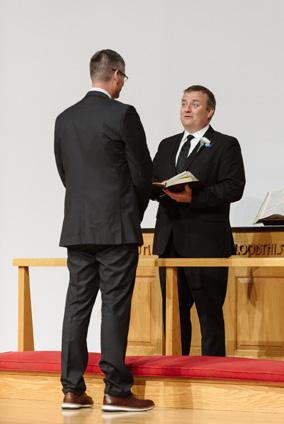

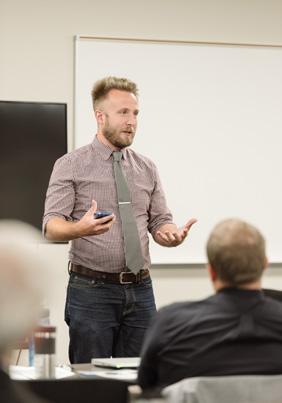
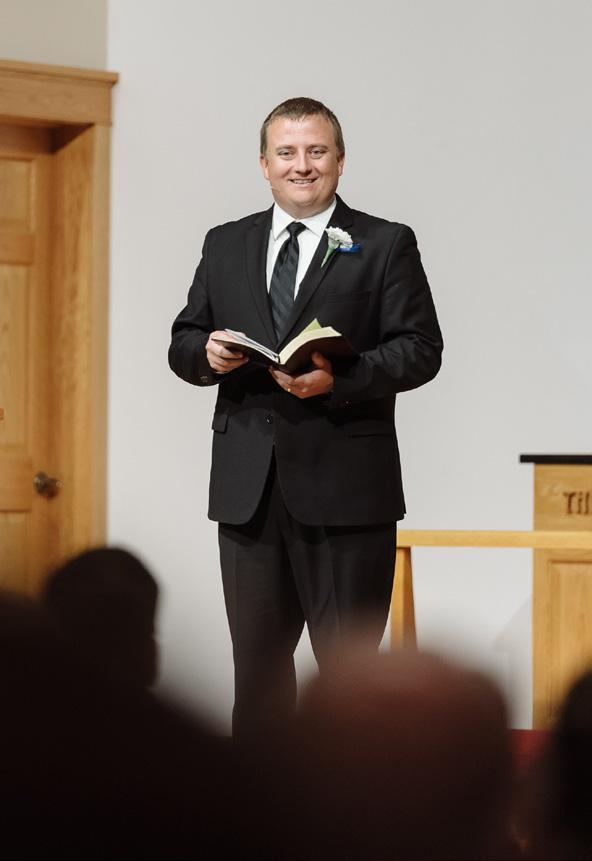
TOP: Pastor Micah Hjermstad (kneeling) was installed Oct. 3 by Pastor Lyndon Korhonen, outgoing president. Also participating in prayer were Pastor Wayne Hjermstad, Pastor Gary Jorgenson, and Pastor Terry Olson. ABOVE: David Olson, chair of the Coordinating Committee, gives a report at the all boards meeting on Oct. 4.
FROM TOP: Pastor Terry Olson gave the message at the installation service. Pastor Hjermstad installs Pastor Andy Coyle as the director of Home Missions. Hans Tanner (foreground) listens to reports given by various departments at the all boards meeting.
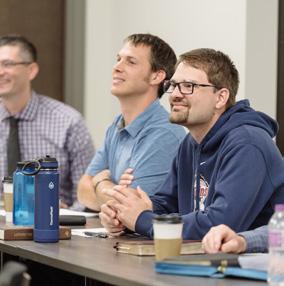
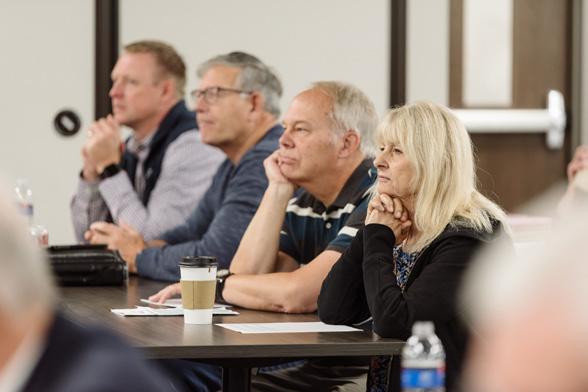
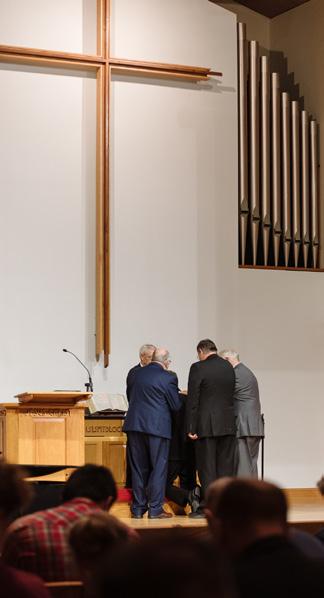
“Do not be led away by diverse and strange teachings, for it is good for the heart to be strengthened by grace.”
~Hebrews 13:9a
What approach is best for today’s teens in their spiritual battles?
God’s Word consistently provides a voice of warning and a voice of wonder. The voice of warning reminds us of the nature of sin.
Scripture is very direct with us about the evil of our own hearts, the enemy of our souls, and the enabling of the world’s influence. Believers in Jesus can be focused to take steps that address one of these sources of sin, but the victory is not found in our resourcefulness. Even when we prepare ourselves to be mindful of all three sin sources, we tend to start strong and fade quickly. In the regular, ordinary, daily grappling with sin, we find that the more we strive in our
own strength, the more we are tripped up. Unlike a popular meme mocking difficulty, the struggle really is real.
With the warning arrives the wonder.
The voice of wonder is pointing to the wonder of a counselor. Our Savior King is near! The author to the Hebrews brings an important contrast to his readers: in the concern for the darkness arrives the light of God’s grace. Directly after announcing the fact that our Savior King is the same yesterday, today, and forever (Hebrews 13:8), the writer turns our attention to the temptation of being led away. Does the Bible call God’s people to try harder? Does Scripture single out the enemy to take on first? Does God’s Word point us to fight back with certain intentions?
Yes and no.
Many Scriptures call us to “stand firm” (I Corinthians 16:13, Galatians 5:1, and Ephesians 6:13 to name a few), so cling to God’s promises as a child of God through faith in Jesus. The contrast that Hebrews 13 shows us highlights that the grace of God in our Savior King is the needed source of strength for the battle. “Stand firm” is
not accomplished by our achievement, but by Jesus in us. The strengthening that today’s teens (and adults!) benefit from is God’s grace extended to us through the life, death, and resurrection of Christ.

As a husband, father, and grandfather, I am learning afresh to lean on the grace of God. I am being refreshed by the way in which God’s grace strengthens me. The pressures and problems of the world are not going to let up. The activity of the enemy of our souls will go on. The wickedness of my own heart will make its appearance many times today, but in all these arenas, I can be confident in Christ and the grace that He extends to me.
As today’s teens face the swirling sources of spiritual struggle, we point them to Jesus and His grace. The King of kings is to whom we look. The Savior who is near is the Savior who can strengthen us.
Holt, a member of Living Hope, Rogers, Minn., is the director of AFLC Youth.


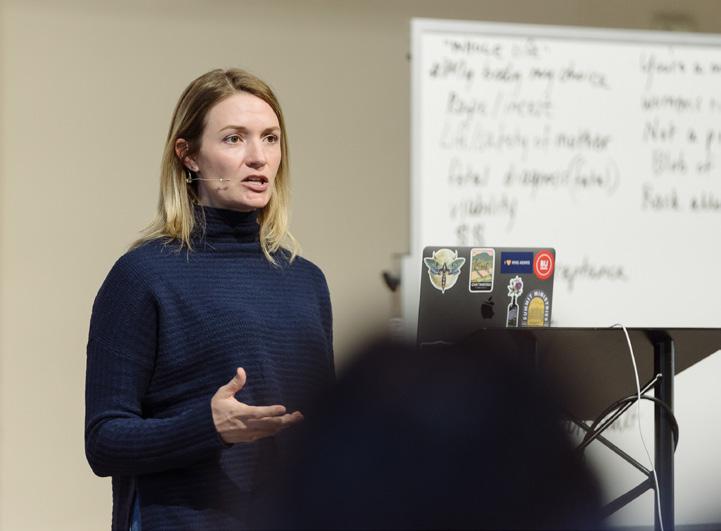
The October 2023 issue of The Lutheran Ambassador will feature spotlights on congregations that specialize in specific areas of ministry. We hope to include areas such as visitation, hospitality, teaching, foreign missions, multiplication, music, community outreach, tithing, and grief counseling. We hope these spotlights will encourage our readers to consider how they might best serve their congregations through the spiritual giftings of their members.
If your congregation fits one of these areas or if you have an idea for an area of ministry to spotlight, please contact us. You may email ruthg@aflc.org, or laeditor@aflc.org.
After a two-year postponement, the 2023 FLY Convention will be held July 3-8 at the YMCA of the Rockies in Estes Park, Colo. Registration for the AFLC’s national youth gathering opened on Oct. 20 with the best rate of $499/student available through Nov. 3. Individuals and church youth groups can find the registration form and the list of deadlines and registration categories online (flyconvention.org).

The annual Christmas concerts hosted by the Free Lutheran Bible College and Seminary will be held Dec. 2-4. Three concerts will be offered: Friday, Saturday, and Sunday evenings. In addition, the men’s and women’s basketball teams will each play two home games over the weekend.
A Seminary Symposium is scheduled for Jan. 11-13 at the Free Lutheran Seminary. The theme is “Patristics,” focusing on the writings of early Christians and church fathers. Guest instructors will include Dr. Daniel Janosik, from the Southern Evangelical Seminary; Pastor Matthew Ballmann, AFLC church-planting pastor in San Antonio, Texas; and Pastor Andrew Kneeland, PhD candidate at Concordia Seminary. The symposium will conclude with the Georg Sverdrup Society Forum.
• For more information, visit flbc.edu.
Apologist Megan Almon (above and right), from the Life Training Institute, was the featured speaker at the Free Lutheran Bible College’s fall Spotlight conference, held Oct. 9-11 on the Plymouth, Minn., campus. Almon’s three sessions covered “A Case for Life,” in which she explained how to communicate and defend a pro-life view both persuasively and graciously; “Reshaping the Pro-Life Apologetic,” and “Beauty Matters,” a discourse on why beauty is an important aspect of
who and what we are and the reality in which we live. In a fourth session, she opened the floor to student’s questions about life issues.
The three session videos will be available on the FLBC Vimeo web page (flbc.edu/defending-life).
Women of the AFLC, you are invited to join us in our Women’s Missionary Federation Bible study in 2023. Our study, titled Women of Redemption, takes us into portions of the Old Testament. We will study the stories of Eve, Hagar, Leah, and Tamar (from the Book of Genesis), Rahab (from the Book of Joshua), Deborah (from the Book of Judges), Naomi and Ruth (from the Book of Ruth), and Hannah and Abigail (from the Book of I Samuel). Our study was written by Tami Demo and Michele Mobley. We will look at topics that cover forgiveness, being known by God, steadfast love, righteousness, kindness, leadership, relationships, God’s favor and rest, humility, and discernment.
Our writers describe the study this way:
“Throughout this Bible study we hope for you to learn that God’s perfect plan does not depend on your perfect obedience but on God’s perfect sovereignty. We will look at these Old Testament women who lived imperfect lives and yet God’s plans still prevailed. Be encouraged that God’s will is sovereign no matter how flawed we are. Just like the women of redemption in this study, God rescues us from our sin, we are restored to a relationship with Him, and through His faithfulness, we are redeemed.”
“For He has rescued us from the dominion of darkness and brought us into the kingdom of the Son He loves, in whom we have redemption, the forgiveness of sins” (Colossians 1:13-14).
How wonderful is the thought that many of the AFLC women across the United States are going through the same Bible study for the year, whether in a group or individually. We can think of it as one of the common threads that runs through the WMF.

Watch the WMF website and our Facebook
page for further information. You will also receive information in the end-of-the-year WMF mailing that will come out later this fall. The studies will be mailed out as soon as they are available, and orders are received.
Johnson, a member of Christ the King Lutheran, Wilson, Wis., is the executive secretary of the Women’s Missionary Federation.
Pastor Rich Carr was installed Oct. 9 at Bethany Free Lutheran, Astoria, Ore., with Pastor Lyndon Korhonen, former AFLC president, officiating.
Pastor Todd Klemme was installed Oct. 9 at Zion Free Lutheran, Wadena, Minn., with Pastor Micah Hjermstad, AFLC president, officiating.
An installation service was planned for Oct. 23 for Pastor George Lautner at Holmes Evangelical Lutheran, Clarion, Iowa, with Pastor Micah Hjermstad officiating.
An installation service was planned for Oct. 23 for Pastor Rob Edwards at Emmanuel Lutheran, Kenyon, Minn., with Pastor Gary Jorgenson, AFLC vice president, officiating.
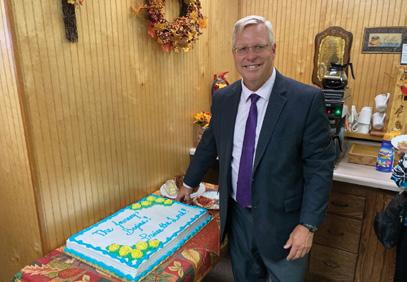
An ordination service was planned for Oct. 23 for Miao “Holmes” Zhao, at Emmaus Lutheran, Bloomington, Minn., with Pastor Lyndon Korhonen officiating. Holmes, a 2020 graduate of the Free Lutheran Seminary, serves Living Stone Chinese Fellowship, St. Paul, an AFLC Home Missions congregation.
Correction: Josiah Coyle was not named as one of six children of Pastor Andy and Monica Coyle in the October issue, pg. 20.
Ralph & Phyllis Peterson
Pastor Walter Beaman Harriet Rolf Dean Harris
Gordon Thureen
FLAPS
Pastor Paul Nash Mert Warner
Pastor Walter Beaman
Charlotte Fruehauf
Fred Mundfrom
Arlene Carlson
Lutheran Ambassador Charlotte Fruehauf Harriet Rolf
Parish Education Harriet Rolf Charlotte Fruehauf
Seminary Harriet Rolf
Vince Larson
WMF
Lavonne Perseke World Missions
Llew Pederson
Joanne Smith
Pastor Alvin Grothe Martha Baumgarn
... in honor of
Pastor Lyndon and Linda Korhonen
John and Carol Markwell
Parish Education
Lucy Boyum World Missions
Lucy Boyum
Pastor Richard Frederick, 82, of Greenbrier, Ark., died Sept. 23. Born Jan. 14, 1940, in Homer, Neb., he was the son of Pastor Sherman and Fredericka Frederick. He married Jeannette Franklin on Dec. 28, 1961.
He graduated from Emporia High School, Emporia, Kan., in 1958. He earned a bachelor’s degree in 1962 from Emporia State University, Emporia. He graduated from Central States Theological Seminary, Fremont, Neb., in 1966, and was ordained as a Lutheran minister. He earned a D.Min. in New Testament theology from Oral Roberts University, Tulsa, Okla., in 1992. He served congregations in Kansas City, Mo.; Heber Springs, Ark.; Bryant, Ark.; Garden City, Kan.; and Stuttgart, Ark. He joined the AFLC fellowship roster in 1997, and served Living Word Lutheran, Windom, Minn.
Surviving are his wife; three children, Ann (Rob) Frederick Pierson, Matthew (Breezy) Frederick, and Drew (Amanda) Frederick; grandchildren and greatgrandchildren.
A private family graveside service was held. Memorials were requested to your chosen local congregation or Christian charity.
Below is the 2023 schedule for The Lutheran Ambassador. Please be in prayer for each issue. Note the deadlines and special emphasis of each issue. If you have an idea regarding a general article, a certain issue, or have an interest in writing, please contact the editors. Email us at ruthg@aflc.org or call (763) 545-5631.
January
December 1 Christian Education
February December 12 The Exodus March
January 30 Lent/Easter
April February 27 AFLC Schools May March 30 Church History
June May 1 Evangelism July May 31 Missions
August July 3 Conference Review September July 31 FLY Convention October August 31 Congregational Spotlight November October 2 Reformation/Thanksgiving December October 31 Advent/Christmas
Please note, information regarding the Annual Conference, scheduled for June 14-17 at the Ramkota Convention Center, Sioux Falls, S.D., will be featured in the May issue, with a deadline of March 30. This issue will include the schedule, board and committee nominees, registration, and WMF Day schedule and registration. Other conference information will be printed as it is available, including registration, housing, and youth and children’s activities.
Pastor Jim Johnson was installed Sept. 25 at True Vine Lutheran, Mora, Minn., with Pastor Lyndon Korhonen, former AFLC president, officiating. Johnson, pictured right, served the congregation on an interim basis before accepting a permanent call.
“Indeed, I have a beautiful inheritance” (Psalm 16:6b).
Have you ever received an inheritance? An inheritance is the fruit of someone’s work given to someone else as a gift.
I’ve received many inheritances, both spiritual and physical. My dad decided to leave an inheritance for his children that would continue on as an inheritance to future generations—the family lake cabin in northern Wisconsin. This magical, restful place, packed full of special memories, has been a haven of rest and renewal for our family for more than 60 years. My dad set it so that as long as family members are interested in investing in and maintaining the cabin, it’s ours to use and enjoy. It’s a gift that keeps on giving.
An inheritance far more precious than the cabin is the
heritage of faith my parents left for me. In response to this great inheritance, I responded to God’s call in my life to serve in overseas missions. Paul and I also inherited a great example and mission vision from his father, John Abel, who started the AFLC mission work in Brazil. We’ve invested our lives in the lives of countless others with the hope that this godly inheritance will keep blessing and preserving the Word of God. Like Nicolai Grundtvig, who penned a fifth verse to the great hymn A Mighty Fortress, we sense our responsibility to spread the light of the gospel in Brazil.
“God’s Word is our great heritage and shall be ours forever.
To spread its light from age to age shall be our chief endeavor.”
Hebrews 11:8 says: “By faith Abraham obeyed when he was called to go out to a place that he was to receive as an inheritance.” The story of the Church has been one of passing down the baton of faith, generation by generation. Now it’s our turn. I like what Dr. James Dobson writes about leaving an inheritance of faith: “The objective to living is to pass on a heritage of faith to those you love and to be with them in eternity.”
Our Free Lutheran heritage is a wonderful inheritance worth passing on. It’s a blessing to see the next generation of Free Lutheran pastors and missionaries in Brazil promoting and teaching our Free Lutheran heritage through their publications and videos, exalting the Word of God as our great heritage.
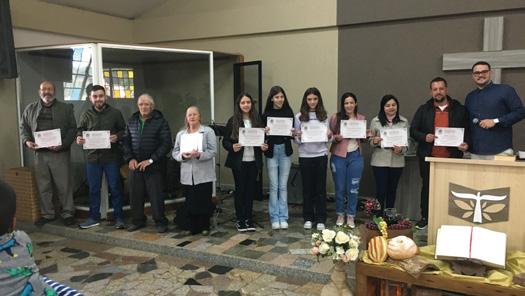
Our mission as Christians is to pass on the living hope we have in Jesus as described in I Peter 1:3-5: “Blessed be the God and Father of our Lord Jesus Christ! According to his great mercy, he has caused us to be born again to a living hope through the resurrection of Jesus Christ from the dead, to an inheritance that is imperishable, undefiled, and unfading, kept in heaven for you, who by God’s power are being guarded through faith for a salvation ready to be revealed in the last time.”
While we live here on earth let’s spread the good news, remembering that the best of our inheritance is yet to come.
Abel is an AFLC missionary serving in Curitiba, Brazil.

The Lutheran Ambassador Publication No. 588-620, Filed 09-12-22
Issued monthly. Twelve issues annually.
Annual subscription price $0
Mailing address of Office of Publication and headquarters of General Business Office: 3110 E. Medicine Lake Blvd., Minneapolis, MN 55441.
Publisher: The Association of Free Lutheran Congregations.
Editor: Pastor Robert Lee, 3110 E. Medicine Lake Blvd., Plymouth, MN 55441
Managing Editor: Ruth Gunderson, 3110 E. Medicine Lake Blvd., Minneapolis, MN 55441
Owner: The Association of Free Lutheran Congregations, 3110 E. Medicine Lake Blvd., Minneapolis, MN 55441.
With the 2022 year soon coming to a close, I wanted to provide an update on where The Lutheran Ambassador is at financially. This year, we began to offer The Lutheran Ambassador at no cost to our subscribers. So where does the funding come from to produce our monthly magazine? There are two main sources of income. First, we receive gifts from generous donors. And second, we receive a guaranteed subsidized income from shared AFLC ministries. Members of the AFLC Coordinating Committee have graciously given a gift to help support three months’ worth of expenses for this year.
As of September 30, we are still in need of $7,000 in gifts to meet our 2022 budget. If you are interested in giving to The Lutheran Ambassador, you can give online (aflc.org/give) or you can mail your donations to the AFLC, 3110 E. Medicine Lake Blvd., Plymouth, MN 55441.
Thank you to all of our generous supporters who have given financially this year! We are unable to produce this publication without your financial and prayer support. If you have any questions, please reach out to me through email at katie.johnson@aflc.org.
Known Bondholders, Mortgagees, and Other Security Holders: None.
The purpose, function, and nonprofit status of this organization and the exempt status for Federal income tax purposes has not changed during preceding 12 months.
Publication Name: The Lutheran Ambassador.
Issue date for circulation data: September 2022
Total number of copies (net press run):
Avg. copies each issue during past year: 2072
Copies September 2022 issue: 2106
Paid circulation:
Mailed outside-county paid subscriptions stated on Form 3541:
Avg. copies each issue during past year: 410
Copies September 2022 issue: 0
Mailed inside-county paid subscriptions stated on Form 3541:
Avg. copies each issue during past year: 20
Copies September 2022 issue: 0
Through outside mail sales:
Avg. copies each issue during past year: 3
Copies September 2022 issue: 0
Total paid and/or requested circulation:
Avg. copies each issue during past year: 433
Copies September 2022 issue: 0
Free distribution by mail:
Free distribution outside the mail:
Avg. copies each issue during past year: 1265
Copies September 2021 issue: 1703
Total free distribution:
Avg. copies each issue during past year: 1795
Copies September 2022 issue: 1806
Total distribution:
Avg. copies each issue during past year: 1795
Copies September 2022 issue: 1806
Copies not distributed:
Avg. copies each issue during past year: 277
Copies September 2022 issue: 300
Total:
Avg. copies each issue during past year: 2072
Copies September 2022 issue: 2106
Percent paid and/or requested circulation, average and September 2022 issue: 0%
Publication is required and will be printed in the November 2022 issue of The Lutheran Ambassador
/s/ Ruth Gunderson, Managing Editor
~Katie Johnson, director of Business Management
Health has been on our minds for a while now. We’ve been paying more attention to our coughs and sneezes, and many of us have watched a friend or loved one struggle through a serious illness or disease.
Sickness is a common experience of us all. It’s an unpleasant reminder that not all is right with the world around us; things aren’t as they are supposed to be. But we can be thankful that the Jesus in John 9 is our Lord and King, who is able to heal us!
see. The works and words of Jesus brought healing.

This is my first month serving as editor of The Lutheran Ambassador. I’m grateful for the chance to serve our AFLC in this way.
The story of the man born blind in John 9 is sometimes counted as the sixth great miracle in the fourth Gospel. Jesus and His disciples come upon a blind man sitting near the temple who was begging for food or money. This man couldn’t see, but the people who lived and worked in the area saw him every day and knew him well. The disciples asked Jesus whose sin caused the ailment, and Jesus responded in verse three: “It was not that this man sinned, or his parents, but that the works of God might be displayed in him.”
Pastor Andrew KneelandYou know what happened next. Jesus spit on the ground to make mud, rubbed the mud on the blind man’s eyes, and commanded him to go and wash in the nearby Pool of Siloam. Put yourself in the blind man’s position for a moment: a stranger just muddied up your face and told you to stumble across town to get clean. Would you do what Jesus said? This man did because he knew who Jesus was and trusted the promise. He went to the pool, washed his face, and then, for the first time in his life, he could
This is how Jesus has always done things. John 1 says, “All things were made through him, and without him was not anything made that was made.” He was on the scene back in Genesis, putting plants and animals and hills and valleys in their place. And the way Jesus healed the blind man in John 9 is very similar to how he first created Adam. The dust from the ground and the breath of life from His mouth made a living creature. Out of nothing, God created everything. Where there was darkness and blindness, God made light and sight.
This story in John 9 isn’t a guarantee that Jesus will heal all our bodily needs or ailments, though He is able to. But this story about Jesus the Healer gives us an example of how Jesus heals our greatest sickness and promises an eternal life where everything broken will be made right again. Just as He did in Genesis and in John, the works and words of Jesus bring light to our spiritual blindness and restore us to life.
To defeat the devil and satisfy God’s righteous standard, Christ took on human flesh and bones and lived here on earth. He offered Himself as a perfect, spotless, once-for-all sacrifice and rose from the grave to vanquish death’s strong grip over us. The righteousness He earned is available to anyone who listens to the creative and healing words of Christ—words that create and grow saving faith.
Sickness reminds us that all is not right with the world. But the works and words of our healing God bring us life and light.
Taking this position would have felt like being pushed into the deep end if it weren’t for the outstanding work of Ruth Gunderson, our managing editor. She gets the credit for anything good, true, and beautiful in these issues. And I can’t express enough gratitude for Pastor Lee’s years of leadership of The Lutheran Ambassador. His wisdom, wit, and faithfulness are truly one of a kind and will be missed in these pages.
Many of you might not know me, so let me briefly introduce myself. My name is Andrew Kneeland, and I’m a pastor of Gloria Dei Lutheran Church in St. Louis, Mo. Esther is my wife of eight years, and we have three young children: Titus is 6, Leah is 4, and Arlo is 2. I’m also a student at Concordia Seminary and will be finishing up my PhD in Historical Theology in the next several months. Next year my family will transition back to Minneapolis to serve as the Free Lutheran Schools’ Institutional Effectiveness Director.
We would love to meet or reconnect with you. And feel free to reach out to me with any of your thoughts or suggestions. I’d love to hear from you. The editor’s email is: laeditor@aflc.org .
... the works and words of Jesus bring light to our spiritual blindness and restore us to life.
building the base
There are a lot of good things to spend our time and energy on in this life. From spending quality time with family, to exploring God’s beautiful creation. From investing in our careers and our communities to stewarding our finances. Or even submitting to our body’s own physical need for rest. These are all good things. At what point do these good things become dangerous distractions?
Think of all the commitments you have in your own life. Where does investing in your local congregation rank on your evertightening schedule? At what point would the congregation take priority over some of these other good things?
It can be easy for us to view our local congregation as just another good thing for us to balance in our overcommitted lives. It becomes no different than the local recreation board. Our Fundamental Principles remind us that the congregation is far more glorious than any civic organization or community commitment: “According to the Word of
God, the congregation is the right form of the Kingdom of God on earth” (FP 1). It is where we encounter the Kingdom of God. We don’t have to wait for Christ’s return to participate in His Kingdom; we participate in it now, in the local congregation. It is a place for us to receive the good gifts of God through His Word. It is also a place to serve.
Fundamental Principle No. 12 states, “Every free congregation, as well as every individual believer, is constrained by the Spirit of God and by the privileges of Christian love to do good and to work for the salvation of souls and the quickening of the spiritual life, as far as its abilities and power permit …” Put simply, each congregation, as well as each individual Christian, is to be engaged in soul-winning, if I may use that term. The realization of our own limitations are recognized here in this principle, “as far as its abilities and power permit.” Note, it doesn’t say as far as our priorities permit. Congregations are to be about the work of advancing the Kingdom of God, at the constraining of the Spirit of God. Friends, do you sense the Spirit
moving you to work in His Kingdom? Has He given you a love for His Kingdom, for His Word, and for others?
The authors of the Fundamental Principles emphasize that each one of us has work to do. God has called each of us to congregations, places where we are fed, nourished, and equipped. But these are also places where we are to use our gifts to work for the salvation of souls. In the Sermon on the Mount, Jesus instructs the crowds to “seek first the Kingdom of God and His righteousness, and all these things will be added to you” (Matthew 6:33). What would it look like if we viewed our local congregations not simply as another good option worthy of our time, but instead see it as the right form of the Kingdom of God on earth? Would we begin to prioritize service in the congregation?
Langness serves Abiding Word Lutheran, Deshler, Neb.